John M.G. Barclay, ‘Food, Christian Identity and Global Warming: A Pauline Call for a Christian Food Taboo’, The Expository Times 121 (2010): 585-93.
Over the past couple years I have repeatedly returned to the article listed above. Not because I forget about the main point, but because I find it incredibly compelling. I just keep coming back to it. I pour over the arguments; they keep haunting me. And so, naturally, I tell everyone about this article so it can haunt them too. But often I see people immediately dismiss the central thesis. I expect that a handful of people, upon first glancing at the abstract below, will also find it questionable. Don’t dismiss it so quickly though. Let it sit. Chew it over:
Meals and food were clearly important in establishing early Christian identity, and Paul stresses two principles that govern Christian practice: that food can only be eaten in an orientation of thanksgiving to God, and that care must be taken concerning the effects of eating on others. In some cases, he insists, this may require Christians to abstain from certain foods. Given the scale of the damage caused by greenhouse gases arising from global livestock production, it is argued here that Christians now have an urgent responsibility to reduce greatly, or even cease, their consumption of meat. (Link to Article)
If you don’t have the time to read a nine-page article (you have the time), here are a few mic-drop-worthy sections which capture the force of how the argument unfolds.
It is central to Christian discipleship to consider the effects of one’s practice on others, to look beyond one’s own legitimate rights and freedoms to see how others are affected. Even food – what we eat, and how and where we eat it – can have serious knock-on effects on others, unintended, perhaps, and unexpected; but it is our responsibility to know those effects and to weigh them.
As Paul puts it…‘if food is the cause of my brother’s falling, I will never eat meat, lest I cause my brother to fall’ (1 Cor 8.13). Note that Paul’s rule here is pragmatic, contextual and specific in application: he is not banning all meat-consumption for all Christians for all time, but asking them to consider what in their context does or does not harm other people. The ‘harm’ is, in this context, the destruction of their faith-commitment to Christ, but since the overall principle is love (1 Cor 8.1; cf. 13.1-13), we may take him to be equally opposed to practices that violate the demands of neighbour-love.
Barclay offers some evidence from recent studies to show how the increasing production of meat (increasing production due to the increasing demand) contributes to global warming through the obliteration of forests and livestock emission of greenhouse gasses (mostly sheep and and cows, however). Such meat consumption is harmful to the earth. By extension, of course, meat-consumption can, in the words of Paul, bring about the destruction of our neighbor – quite literally. If this train of thought is valid, then Barclay’s conclusion regarding the contemporary application of Pauline ethics is warranted:
Paul’s ethic is both highly principled and highly contextual, and he allows for the exercise of specific food taboos if they are necessary means for the Christians’ orientation to God and for their attention to the welfare of the weak. In our present context, we need to face up to a very particular crisis which has a direct bearing on our patterns of food consumption. It is now our Christian duty to reduce our meat consumption to an absolute minimum, if not zero, and we should have no hesitation in urging this self-denial on ourselves and on others, for the sake of the future of our planet and the lives of its most vulnerable inhabitants. Food should thus become, in at least this respect, a marker of Christian identity; anything less and we will fail in our obligation to embody and express God’s embrace of the world in the life, death and resurrection of Jesus Christ.
We are required to ask ourselves, ‘Can we eat this food – or continue this pattern of food consumption – in honour of the Lord and in thanksgiving to him?’ Can we do so knowing the damage this is doing to the world he created and for which he gave himself in Christ? We are also required to ask, ‘What are the effects of my eating on others, and what damage might I be doing to them, even unintentionally so?’ And here the more we know about the effects of livestock production on climate change, and the more we know about the devastating effects of climate change on the world population, especially on the poorest and most vulnerable, the more this question should haunt our meal tables.
Indeed, this question has haunted my grocery shopping. Can I buy meat – at least lamb and beef – while claiming to love my neighbor as myself? Every time I return to this article, I am more convinced: I am a hypocrite if I think I can love my neighbor while purchasing goods which put my neighbor in the danger of destruction.





2 Comments
Leave your reply.